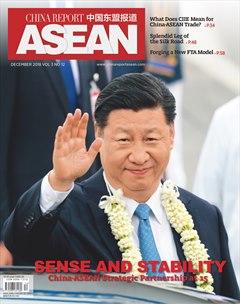共建网络空间命运共同体
2015年12月16日,在中国乌镇召开的第二届世界互联网大会上,习近平发表主旨演讲,重点论述了“网络空间命运共同体”的理念。他说,网络空间是人类共同的活动空间,网络空间前途命运应由世界各国共同掌握。实际上,这一理念在习近平2014年致首届互联网大会的贺词中就已经提到。本届会议期间,他再度提及并进一步提出了共建网络空间命运共同体的5点主张:第一,加快全球网络基础设施建设,促进互联互通。第二,打造网上文化交流共享平台,促进交流互鉴。第三,推动网络经济创新发展,促进共同繁荣。第四,保障网络安全,促进有序发展。第五,构建互联网治理体系,促进公平正义。共建网络空间命运共同体,这是中国领导人在互联网领域提出的中国主张,也需要国际社会共同努力才能实现。
Jointly Building a Community with a Shared Future in Cyberspace
In his keynote speech at the Second World Internet Conference (WIC) in Wuzhen, China, on December 16, 2015, Xi Jinping outlined his vision for a community with a shared future in cyberspace, a vision he first brought up in his message to the First WIC in 2014. He said that since cyberspace as a sphere of human activity belongs to humanity, its future should be decided by all countries of the world. In a five-point proposal for building a cyberspace community with a shared future he highlighted the need to (a) accelerate the development of a global Internet infrastructure and promote interconnectivity, (b) create online platforms to facilitate cultural exchanges, (c) promote the development of the Internet economy and encourage innovation, (d) ensure Internet security and orderly development, and (e) build a cyberspace governance system to ensure fairness and justice. The goal of building such a cyberspace community, as proposed by Chinas leadership, can be achieved only through joint efforts by the international community.
维护和发展开放型世界经济
中国倡导维护和发展开放型世界经济,主张各国应进一步扩大相互开放,旗帜鲜明地反对各种形式的贸易保护主义,齐心协力做大世界经济这块大蛋糕。为此,各国应维护自由、开放、非歧視的多边贸易体制,不搞排他性贸易标准、规则、体系,避免造成全球市场分割和贸易体系分化。要探讨完善全球投资规则,引导全球发展资本合理流动,更加有效地配置发展资源。
Maintaining and Developing an Open World Economy
China is committed to maintaining and developing an open world economy. It encourages all countries to open their doors wider, stand firm against protectionism in all its forms and work in concert to promote the growth of the world economy. To this end, they should work for a free, open and nondiscriminatory multilateral trading system, and resist any standards, rules or policies that condone or encourage exclusionary trade practices. Efforts are called for to avoid undue fragmentation of the global market and trading system. All avenues should be explored to improve global investment rules, and ensure rational flows and more effective allocation of global development resources.

